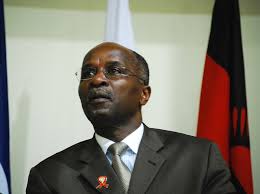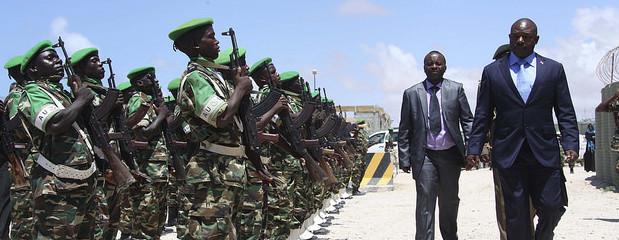SADC respects Zimbabwe’s early election date – By Simukai Tinhu


SADC secretary general Tomaz Salomao stated that the Zimbabwean Constitutional Court’s ruling on an end of July election would be respected.
On 15th the Southern Africa Development Community (SADC) held an extraordinary summit on Zimbabwe in Maputo. The main issue discussed was the 31st July election date set under the pretext of complying with the Constitutional Court’s ruling that elections must be held by the end of July. The opposition and pro–democracy forces cried foul, and accused President Mugabe of subverting the constitution.
At the end of the summit, the SADC secretary general, Tomaz Salomao briefed reporters of its outcome: “the summit acknowledged the ruling of the constitutional court on the election date and it will be respected.” He added that “What the summit recommended was, in recognising that there was need for more time, that the government of Zimbabwe engages the constitutional court to ask for more time beyond the deadline of July 31.”
Tendai Biti, the secretary general of the Movement for Democratic Change – Tsvangirai (MDC – T) had summarised the summit deliberations to his supporters through his facebook page. In his summation, which departs from that of SADC’s official communiqué, Biti wrote, “Government through the Ministry of Justice is ordered and directed to make an application to the constitutional court following consultations by all political parties, seeking to move the date of the election from the 30th July 2013.”
The wording and substance of Biti’s summation is problematic. Not only does the MDC secretary general superimpose the words ordered and directed, but he fails to mention that the regional body acknowledged the ruling of the constitutional court on the 31st July election date and therefore cannot be overturned. This would be tantamount to interference into the internal affairs of another country. Thus SADC made a recommendation, and not a directive, as was implied in Biti’s summation.
The recommendation is also not binding. In other words, it is up to the government, (through the Ministry of Justice and Legal affairs) to make an application and seek an extension. The misleading wording by the MDC – T Secretary General can be forgiven as being a show for his party’s followers. But unfortunately, this statement, which conflicts with the SADC version of the outcome, has sent opposition supporters into celebrations, interpreting this outcome as a victory for the opposition and pro-democracy forces.
Is the outcome of the SADC summit a cause for celebration, and can we call it a victory for the opposition? Several scenarios might now unfold:
First, it appears that the regional body has urged, and not directed the opposition forces and ZANU – PF to consult each other on the need to approach the constitutional court and request that elections are delayed. The President, through his Ministry of Justice and Legal Affairs, might seek recourse to the Constitutional Court if he is sufficiently convinced that there is need for an extension. The Ministry of Justice cannot apply to the courts on the basis that the President acted unconstitutionally. SADC has made it clear that they acknowledge and respect the original outcome of the Constitutional Court, but most probably on the basis that it is impractical to have elections on the 31st July.
If President Mugabe states that he is unconvinced by the arguments for an extension, SADC has no mechanism or legal mandate to coerce President Mugabe to approach the courts. However, it appears that President Mugabe has conceded on this issue. Speaking in Maputo just after the summit, he told reporters that “It is a happy outcome for Zimbabwe… the final decision was that perhaps we should appeal to the court to examine the reasons for the arguments that have been made by others for giving people a little longer time. Our Ministry of Justice is going to do that to appeal to the court and the decision of the court then will be binding on us. But if the Court says okay go beyond July 31st by a week or two, I hope it will satisfy the others (opposition) who want a little more time.”
However, according to Lovemore Madhuku, the head of National Constitutional Assembly, an omnipotent organisation when it comes to constitutional matters in Zimbabwe, the government has no legal basis or “jurisprudence in approaching the Constitutional Court seeking an extension.” It should, however, be recognised that President Mugabe has successfully sought delays of local election on three previous occasions.
If the President does indeed seek an extension, the constitutional court might dismiss the application for different reasons. It is important to note that it is the same judges who were subject to abuse and ridicule by the opposition who are now being asked to review (and overturn) their ruling following intervention of SADC on behalf of the opposition. Madhuku also added that if the courts accept the application, this will effectively make SADC heads of state a defacto higher court, in the process creating a precedent where future litigations will approach SADC.
Another Zimbabwe legal expert, Terence Hussein, added that President Mugabe might genuinely apply for an extension, but the Constitutional Court might question the government approaching it to seek an extension over an order that it has complied with. Patrick Chinamasa, whose ministry is tasked with making the application, has also stated that there is no guarantee that the courts will allow for a delay.
If it turns out that the Supreme Court, sitting as the Constitutional Court, dismisses the application then what will the opposition’s next course of action be? Will they accept the decision, or seek SADC’s intervention once more? SADC does not have legal power in a member state to reverse court decisions – its secretary general also stated in his briefing to the press that the court ruling will be respected.
Secondly, SADC’s recommendation is asking the state to seek an extension beyond the 31st July by at least two weeks. It would be a surprise if President Mugabe requests an extension beyond two weeks considering his party wants the elections to be held sooner rather than latter. Indeed, he told reporters that he will seek an extension of only “one or two weeks.”
It is therefore inconceivable that reforms that could not be made in four years will be carried out within the two weeks. Patrick Chinamasa, the ZANU–PF strategist and Minister of Justice and Legal Affairs, has stated that he would only implement what the parties have agreed on. He added that “If we do not agree then there is nothing to implement, until we agree on a particular reform then there is nothing to reform….As ZANU-PF, we are contesting the idea that there is any need for reforms…” Such intransigence clearly indicates that reforms are unlikely to take place at all, let alone within the two week extension period. The question is what the opposition forces would do? Appeal, once again, to SADC or boycott the elections?
Thirdly, and most seriously, which for some reason the opposition appear to have ignored, is that the current parliament expires on the 29th June 2013. The new constitution says that elections must be held within fours weeks following the expiry of the parliament (so 31st July is in perfect compliance with the constitution). By declaring 31st July as the election date, President Mugabe argues that he is trying to limit individual exercise of power by ensuring that all three branches of government (the Judiciary, Legislature and Executive) exist at the same time.
After June 29, there will only be the judiciary (the same court derided by the opposition) and the Executive led by President Mugabe. The life of the Zimbabwe Parliament can only be lawfully extended during times of war or when a state of emergency has been declared, two scenarios that are not currently relevant. Giving President Mugabe the chance to rule by decree might be something that the opposition lives to regret.
ZANU–PF is regrouping, strategising and even preparing for the World Tourism Summit that they hope to co-host with Zambia in August. The opposition is celebrating, even when there appears to be little to celebrate. But ZANU-PF is a tough party to deal with. It would be more advisable for the opposition to task itself with more important issues such as campaigning, encouraging its supporters to register as voters and attempting to forge an alliance, if they are to stand a better chance of unseating President Mugabe’s party.
Simukai Tinhu is a political analyst based in London.






Just to pick up on the ‘four weeks’ deadline for new elections after the parliament closes on 29th June. 31st July is OUTSIDE the four week period.